8 Sci-Fi and Fantasy Novels for People Who Don’t Like Sci-Fi and Fantasy
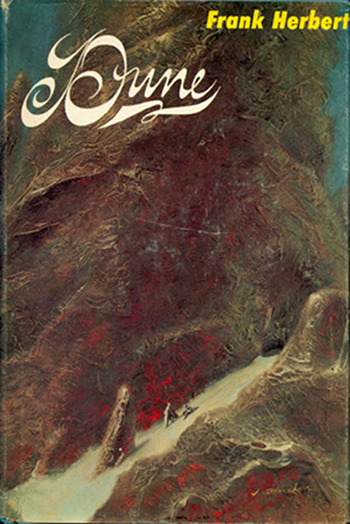 |
Star Wars, The Lord of the Rings and Harry Potter stand tall in the realm of sci-fi and fantasy literature, not just for their narrative strengths – the relative value of which can be debated – but also for their common and rare feat of breaking out into the mainstream of pop culture. Still, there are those people who can’t seem to get into Frodo’s journey to Mount Doom, Luke’s tutelage under Master Yoda or Harry’s inevitable showdown with “He Who Shall Not Be Named.” Among other dubious complaints, genre-haters find these bestsellers to be silly, unrealistic, boring or some combination of the three.
Until the startlingly popular HBO series Game of Thrones introduced the premium cable crowd to a more mature, nuanced take on a fantasy world, you were unlikely to lead any new converts into a land of dragons, swords and sorcery or plasma guns. But even George R.R. Martin’s sprawling epic can be too dense and exclusive to recommend to someone entirely foreign to the genre.
So, whether you are trying to corrupt a previously immovable hater of sci-fi and fantasy or simply want to introduce some gems to your own library, here are a few titles that bend, break, subvert or thoroughly ignore maligned tropes and make for compelling works that stand on their own merit.
8. Stardust (Neil Gaiman)
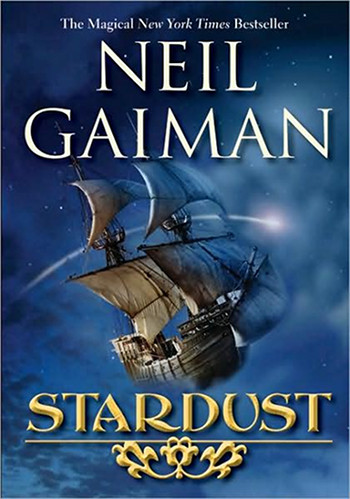 |
What It’s About: On the surface, Gaiman’s novel is about as standard fantasy as it gets. This is the story of Tristran Thorn, a half-Faerie boy living in a picturesque country village called Wall who agrees to retrieve a fallen star for the girl he professes to love. Of course, things don’t go quite as planned, and instead of finding a fallen meteorite, Tristran discovers that the star is a living being named Yvaine. The rest of the tale moves along at a breakneck pace reminiscent of Indiana Jones, wherein the two flee from witches, lions and conniving heirs to the Faerie throne of Stormhold, inevitably falling in love in the process.
Selling Points: Fast, fun, clever and immune to cynicism.
The key word in the above synopsis is “surface.” Taken as it stands, Stardust is a fun, adventurous and romantic tale written in the style of English fantasy from the nineteenth century, and therein lies much of its charm. Still, Gaiman has buried quite a bit in a sprawling narrative, combining fantasy clichés in humorous situations that play out like a comedic stage play more than an earnest tale of star-crossed lovers. You can get quite a bit of enjoyment out of the vivid narrative, which was originally conceived and published as a limited DC Comics run.
Not everyone enjoys reading a book twice, but Stardust is a shining exception, allowing you to see it for the witty comedy it is, or cast that all away and soak up the imaginative world Gaiman has crafted in the tradition of the great English masters. Cynicism is not welcome here, and if you bring it along, you’ll feel a bit foolish by the end, as Gaiman knows exactly what he’s doing, never failing to lose the refreshing optimism of his story despite the many winks and nods to its roots.
You’ll want to book a trip to the moss-covered countryside of the old country after burning through this one. As a bonus, check out the criminally underrated 2007 film of the same name, which was directed by Matthew Vaughn before we cared enough to know who he was.
7. Starship Troopers (Robert A. Heinlein)
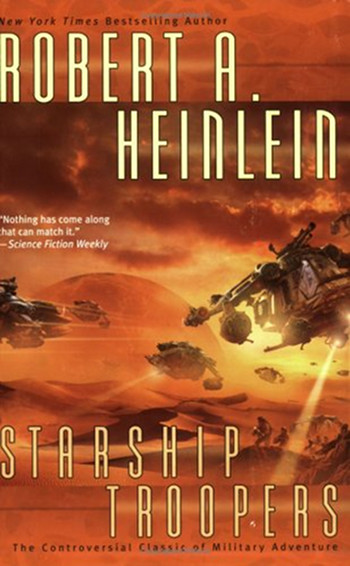 |
What It’s About: One of Heinlein’s (many) masterpieces, Starship Troopers follows the story of Juan Rico, nicknamed “Johnnie,” as he makes his way through the mobile infantry and eventually into battle in a brutal, interplanetary war between mankind and aliens known as “the Bugs.”
Selling Points: Sociopolitical commentary, military philosophy and indoctrination. Okay, so it’s not a fun read, but it’s an important one.
If you go into the 1959 novel expecting something similar to the 1997 Paul Verhoeven-directed film, which is something of an unintentional masterpiece in its own right, you’re going to be sorely disappointed and more than a little confused. That said, if you go into Heinlein’s novel with a fresh pair of eyes, you may come to see the two pieces as a fascinating study of satire and the freedom to be found in adaptation.
But that is neither here nor there.
Johnnie Rico’s story is a simple one. He enrolls in the military, despite coming from a wealthy family, because he sees it as his civic duty to assist his race in the war against the Bugs. Throughout his training, Rico’s initial resistance to the cold and unforgiving world of military command is replaced by a sense of earned belonging and, yes, even superiority to the fellow man that he is ostensibly there to defend.
If you come from a liberal mindset, you’re not going to like the majority of what Heinlein has to say through Rico and his myriad teachers, but this is a case where it is more than worth your time to explore alternate and unapologetic views regarding war, civic duties and suffrage.
Aside from the divisive sociopolitical jargon, Starship Troopers earns high marks for its readability and its incredible depictions of futuristic battle. The entire opening sequence reads like a polished cut scene out of a Starcraft game, and yes, that’s a good thing. Basically, the sci-fi aspects of this novel are a snake in the grass of a larger philosophical discussion, something all writers should strive to achieve.
Whether you’re nodding in solemn agreement and contemplating enlisting by the end or whipping the paperback against the wall, this is a classic that lives up to the hype and deserves your attention.
6. Sand (Hugh Howey)
 |
What It’s About: To give away too much of the plot of Sand would be to do a great injustice to what some consider a modern sci-fi masterpiece. Originally published in five parts, this is a short novel about a broken-up family living in an inhospitable Colorado at some point in the near or distant future. And like so many futures glimpsed in science fiction, this one is bleak and desolate, though not without a sort of cold, starlit desert beauty.
Selling Points: Fast read, intriguing premise, commentary on foreign policy, extremely powerful ending.
For starters, this is a quick read. I finished it in an afternoon at the beach, which I suppose is somewhat fitting. It’s a great introduction to Hugh Howey, a rising guru in the self-publishing world whose Silo Series saw him burst onto the scene in a big way in the exploding e-reader market several years ago.
The three central protagonists of Sand are siblings, and while the two brothers get their chances to shine, it is the eldest sister who holds the most sway. She’s the best sand-diver (yes, sand-diver) among her people, and she uses these abilities to hunt for scraps from the buried old world (our world, we are led to believe). Howey gives us just enough of this elseworld so that we crave knowledge of what came before.
The sand-diving gimmick and unique setting would be enough to recommend this book on their own, but where Sand truly shines is in its central mysteries, which concern not only the long-ago disappearance of the siblings’ father, but also a sinister force from across the wasted desert. For as short a story as this is, you get everything you could want from a Sci-Fi yarn, including tense action, consequential decisions, tearful reunions and a truly badass female character.
As cliché as it is to say, this is a Sci-Fi novel in which the Sci-Fi takes a backseat to the story, and in which the story takes a backseat to the complex and heartbreaking family dynamic at its center. Howey injects family tragedy into a situation that alludes to displaced third-world nations and the forgotten peoples of the world, making this journey as poignant now as it is ever likely to be.
Oh, and the ending is among the best I have ever read. Truly.
5. American Gods (Neil Gaiman)
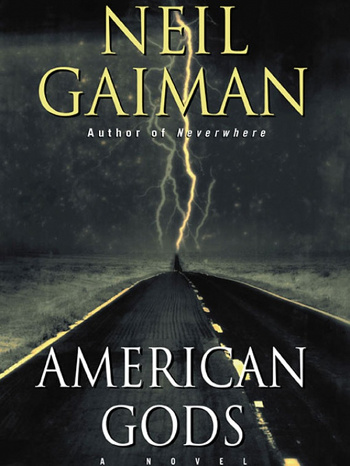 |
What It’s About: In a version of our modern world, gods exist, albeit in weakened and pitiful imitations of their former glory. The central protagonist, Shadow, is a con man whose wife has recently passed on (in a gruesome car wreck), so he takes a job guarding a mysterious old man named Wednesday, who has dreams of rekindling belief in the old gods, many of whom happen to be his close friends.
Selling Points: Original, weird, contemporary and oddly believable.
Putting Gaiman on this list twice is a bit of a cheat, but hey, the man hasn’t established himself as a demigod in the geek realm for nothing. In fact, he’s accrued so much geek cred that he could likely reach some version of permanence in the vein of his fictional gods were he in the same world.
Before diving into the nitty-gritty of what makes this novel so fantastic, the primary reason non-fantasy readers are likely to get invested in it is the very fact that it isn’t fantastical in nature. Gaiman delivers his world and the great characters in it with a sort of deadpan and darkly comic glint that allows us to accept it all at face value. The narrator himself, Shadow, barely possesses a personality of his own. That might be a weakness in another story, but in this case, he represents the perfect vehicle for the audience to observe Mr. Wednesday, Anansi, Anubis and plenty of others ply their strange trades in search of salvation, or at least the freedom from oblivion.
Gaiman’s simple yet genius premise actualizes gods from every culture you can think of, including Norse, Egyptian, African and Asian, and sets them up in a weird, literal conflict against the newly-emergent American Gods. It goes without saying that the old gods don’t have much love for modern American culture, which has given rise to dark, emotionless gods such as The Technical Boy, Media, The Black Hats and The Intangibles, the last of whom are gods of the modern stock market.
In some ways, Gaiman echoes Plato’s central philosophy concerning forms and ideals, in which the belief in something represents its inherent reality and overall worth. It’s an interesting idea, and one you can’t help but believe is possible when you’re finished with Shadow’s waking dream of a journey.
This book is weird. I repeat, this book is really, really weird. But, if you can buy in to the central premise and look past an early scene in which an unsuspecting chap gets devoured by a giant, toothy vagina, you’re in for an entertaining and sneakily emotional story of grief and the difficulty – even among the immortal – of facing mortality.
4. Dune (Frank Herbert)
 |
What It’s About: Dune tells the story of Paul Atreides, the son of a noble family whose newfound control of the desert planet Arrakis comes with swift and devastating consequences. Arrakis is home to the most valuable substance in the universe, the “spice” known as mélange, and in the complex noble society of the far future, noble families will do anything to gain control of it. After a series of brutal events, Paul is thrust into the wild of Arrakis, where he must become one with a tribal people and confront his troubling and uncanny visions of the future.
Selling Points: Intelligent, philosophical, timeless, essential reading.
To call Frank Herbert’s 1965 sci-fi classic epic is a massive understatement. This story is as large-scale as it gets, telling the story of interplanetary war, political maneuverings and religious fanaticism with an efficiency of language that is still a marvel to behold. Dune is the first in an expansive series of novels, but it can be read as a standalone, and, according to some – myself among them – that is exactly what you should do.
Aside from a complex premise that is much easier to follow than you would think, one of the best aspects of Herbert’s masterpiece is the brilliance of his central character, Paul Atreidis, both in his conception and in his choices throughout the narrative. Paul is a genius, and while some authors would use this as a crutch to get him out of dangerous situations, Herbert presents it as something of a double-edged sword, making Paul a powerful figure to the wild Fremen even as he dreads the eventual path his destiny will take him down.
In some ways, Paul shares similarities with Neo from The Matrix; he is told his destiny early on, and the ensuing internal struggle concerns how he plans to go about reaching it or changing it. Paul fights, loves and leads in an alien world among an alien people, and while the plot sometimes gets a little bogged down in sociopolitical and philosophical musings, there are moments of rare beauty in the quiet spaces of Paul’s time among the Fremen.
We’ve seen the hero’s journey told over and over again, and while Paul Atreides is the hero of Dune, he is not a hero in his own mind, but rather a necessary function of destiny. It is a tragic realization that he accepts even as he flawlessly executes his mission along with his adversaries en route to taking control of his planet.
3. The Long Price Quartet (Daniel Abraham)
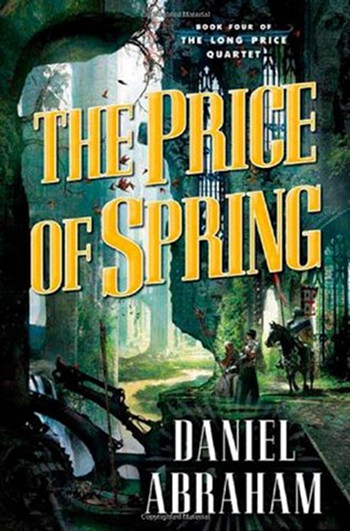 |
What It’s About: Otah is just a humble laborer in the powerful city of Saraykeht, one of the major cities among the Khaiem Empire. While they have no devastating armies or machines of war like their rivals to the west, the Galts, the cities of the Khaiem each have a poet and an andat, a powerful living idea that can topple mountains with a thought. Once traitors sell the secrets of the andat to the Galts, the western world launches a war the likes of which the Saraykeht have never seen, and Otah finds himself caught leading the charge to defend his homeland.
Selling Points: Eastern flair, realistic societies, unpredictable plot, tells the story of a life.
Originally published in the form of four novels, The Long Price Quartet is the first major work penned by relative newcomer Daniel Abraham, and if it’s anything to go by, we may have a new master of fantasy in our midst.
For starters, each of the four novels in The Long Price Quartet tells a self-contained story with a varied caste of characters that evolves over time. The first is an unsettling mystery; the second is a backstabbing tale of espionage, political maneuverings and betrayal; the third tells the tale of a war between the Khaiem and the Galts; and the fourth deals with the ramifications of a broken friendship and the emergence of a new Empire.
I can honestly say that in all my years of reading fantasy, I have never seen an author cover such a breadth of time in the life of a character as Abraham does here. At least, I’ve never seen it done in such a realistic manner. We get the young, brash man who transforms into a reluctant, Aragorn-like leader only to fade into an old man uncertain of the choices he made to get to that point.
One of the things that makes this series such a refreshing read is its complete lack of fantasy clichés. There are, quite simply, none to be found. Even the central conflict has nothing to do with the evil Galts attacking for lands and riches; when their general’s motivations are revealed, you understand completely where he is coming from even as you root for his failure. It’s also refreshing to see an Asian-influenced Fantasy culture, and it makes you wonder why we haven’t seen more of it before.
At the end of the journey, The Long Price Quartet as a sum is far greater than any of its constituent parts, and each of those parts is something special.
2. Tigana (Guy Gavriel Kay)
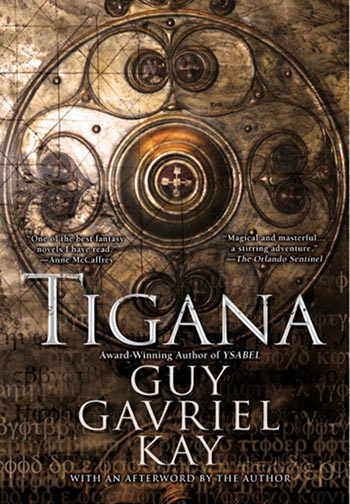 |
What It’s About: Tigana tells the story of a group of rebels seeking to drive a pair of foreign generals from their shores and restore the lost name of their homeland.
Selling Points: Pseudo-historical fantasy, self-contained, difficult to predict, incredible villain.
To some, Guy Gavriel Kay represents the pinnacle of what’s possible in the fantasy genre. To others, he is overly wordy, his worlds and plots dense and difficult to penetrate, and his characters hard to identify with. As you can guess by his position on this list, I happen to be entrenched firmly in the camp of the former, and I would hold Tigana up as a modern masterpiece in any genre.
It’s easy to get invested in the world of Tigana, in part because it so closely represents the geography and culture of Italy and other Mediterranean lands. What’s more, the main character is not the narrator; instead, Devin, a musician, acts as a proxy for the reader to witness the true central characters: Prince Alessan and his companions, Catriana and Baerd.
Kay has crafted a group of characters with backstories all their own, but this story picks up well into their later lives. Their shared histories are hinted at and there are a few flashbacks, but you get most of their motivations through their interactions with each other, often learning more based on what they don’t say than what they do.
The plot of Tigana is interesting, and the characters complex and realistic, but what truly sets this one apart from much of the Fantasy genre is the melancholy core at the center of the narrative, as well as the heartbreaking reveals about both the central protagonists and their chief antagonist.
That antagonist, Brandin of Ygrath, could very well be the most complete villain I have ever read in a fictional work, challenging Magneto for the top spot. The more you learn about him, the more you sympathize with him, even if you can’t completely forgive him for his past transgressions against the characters you’ve grown to love.
No matter what kind of books you read, Tigana has something for you, and I challenge you not to catch a few feels as you reach the gut-punch of an ending.
1. The Name of the Wind (Patrick Rothfuss)
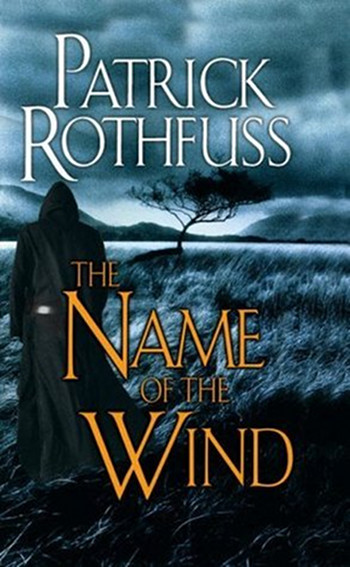 |
What It’s About: The first novel in the as-yet unfinished Kingkiller Chronicles, The Name of the Wind tells the story of Kvothe, a young musician who is orphaned early on in the story, which sets him on a path to being one of the most infamous people in his world. If he is to be believed, Kvothe is responsible for slaying a dragon, out-witting a Fae goddess and, eventually, killing a king.
Selling Points: Beautiful prose, likeable central character, page-turner, plays with expectations.
I struggled with my eventual decision to place Rothfuss’s debut novel at the top of this list, but this is the only book on the list that my mother, girlfriend and aunt all read and thoroughly enjoyed. (That is in no way an indictment of them, but rather a comment on the fact that they typically have no interest in the fantasy genre, and this one had them eagerly anticipating the follow-ups). That has to count for something.
What I admire most about what Rothfuss has done with this novel is the fact that he tells you the ending at the beginning. Of course, he leaves out the juicy details, but that still takes balls of steel. Why? Because we know Kvothe survives. The fact that we’re still glued to the page, riveted over what’s going to happen next, is no easy feat to pull off in a framed narrative.
Rothfuss keeps us invested because, while Kvothe tells the truth, he always tells versions of it. In that, he has some similarities to the Norse trickster god, Loki. Did he really slay a dragon, or was it a lightning lizard? How did he earn the nickname “Kvothe the Bloodless?” How about “The Broken Tree?”
Rothfuss embraces the feel of thefFantasy genre, but he does so while subverting most of its central tropes along the way. That keeps you on your toes, as does Rothfuss’s unfortunately Martin-esque release schedule; book two came out in 2011 and book three has no release date.
This book was so loved when it debuted in 2007 that it has received a bit of backlash from the hipster fantasy community in recent years, but don’t let that dissuade you. Despite some faults, this is a gem, and it’s one of the most well-written works I’ve read in my life.
Previously by Steven Kelliher
“10 Reasons Why TV is a Better Venue for the X-Men Than Film”
“13 Times Character Deaths Pissed People off Rather than Adding Gravitas”
“The 10 Nerdiest MMA Fighters and How They’d Take You Out”
“6 DBZisms Dragon Ball Super Should Keep Intact (and 6 They Should Leave on Planet Namek)”
“7 Movie Action Scenes So Badass They Make You Giddy”
“8 Spider-Mannerisms Peter Parker Must Carry Into the Marvel Cinematic Universe”
“The 9 Greatest Years in the Life of Studio Ghibli”
“8 Fantasy Book Series You Should Check out if You Love Game of Thrones”
“The 10 Best Video Game Cinematic Trailers (for Terrible Games) of All Time”

